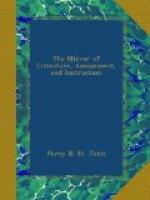“But the sands of life are not formed exclusively of diamond sparks. Flint and granite mingle in the contents of the hour-glass; and Sir Henry often found himself required to listen to fractious complaints of old Roddington’s innovations, of Lawford’s negligence—of roses that would not blow at the gardener’s bidding,—of London booksellers, who would not send down the new novels in proper time,—of old women who refused to be cured of their rheumatism, and young ones who declined becoming scholars at her platting school. His own misdemeanours, too, were frequent and unpardonable. He had a knack of carrying off the very volume she was reading,—of losing her place, and leaving his own marked by leaving the unfortunate book sprawling upon its face on the table, like a drunkard on the ground. He often kept her waiting five minutes for her ride, or twenty for dinner; would stop and detain her, in their walks, while he corrected the practical blunders of some superannuated hedger and ditcher; had a trick of whipping off the thistle-tops while driving her in the garden chair, to the imminent indignation of her ponies; was sometimes seen to nod after dinner, when the morning’s run had been a good one; and had an opinion of his own in politics, which precisely reversed those of Lady Mandeville and her coterie.—In a word, he was often very ‘tiresome!’ and whenever the fair Henrietta was excited into pronouncing that sentence on his proceedings, it was a signal for ill-humour for the remainder of the day; or rather till the spoiled child would condescend to be coaxed into a more satisfactory mood of mind.”
But we are more struck with the appalling fidelity of the following scene in a tale named the Divorcee. The heroine, Amelia, is married in early life to a Mr. Allanby, “a man with 10,000l. per annum, and a grey pigtail:” the match turns out a miserable one: Amelia’s dishonour by Vavasor Kendal, her divorce, and Mr. Allanby’s death are told in a few pages—the guilty pair, Vavasor and Amelia, flee to Paris, and we are introduced to this faithful picture of Parisian vice:—
“The infirmity of Amelia’s health served at least to release her from those forced efforts of gaiety which had recoiled so heavily on her feelings. Her day for vivacity was gone.—In an atmosphere whose buoyancy is exhausted, the feather falls as heavily as the plummet.
“But instead of commiserating the languor and feebleness extending from the physical to the moral existence of the invalid, Vavasor only made her dulness an excuse for flying to the relief of society more congenial with his own tendency to vice and folly. Lady Emlyn who in London was the leader of a coterie devoted to the excitements of high-play,—a coterie that felt privileged to inveigh with horror against ‘gambling,’ because its members ventured their thousands on games where cunning tempers the fortuities of chance,—on the manoeuvres of ecarte and whist instead of the dare-all risks of




